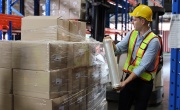Boss uncovered
Having watched his company grow in conjunction with the waste industry, Viridor’s Colin Drummond tells Resource what he believes is next on the resource agenda
 At the dawn of waste management as we know it, there existed Haul Waste, a small Taunton-based waste company. Back then it laid claim to an annual profit of well below £1 million and was run by fewer than 200 employees. Now, under the name Viridor, the business employs 3,000 people and boasts an annual profit of £75 million. With CEO Colin Drummond at the helm (having bought the company for Pennon Group plc 18 years ago), Viridor has been hailed Recycling and Waste Management Company of the Year 2010. Following an appearance on Channel 4’s program, Undercover Boss, which saw self-confessed ‘perfectionist’ Drummond going undercover in his own operations, it’s not a tremendous surprise to see why. As well as demonstrating Drummond’s drive and motivation for his work (and impressive piano skills), viewers were also given an insight into the psyche of his staff, which is for the most part incredibly passionate about the recycling business. Indeed, ‘business’ is a vital word for Drummond.
At the dawn of waste management as we know it, there existed Haul Waste, a small Taunton-based waste company. Back then it laid claim to an annual profit of well below £1 million and was run by fewer than 200 employees. Now, under the name Viridor, the business employs 3,000 people and boasts an annual profit of £75 million. With CEO Colin Drummond at the helm (having bought the company for Pennon Group plc 18 years ago), Viridor has been hailed Recycling and Waste Management Company of the Year 2010. Following an appearance on Channel 4’s program, Undercover Boss, which saw self-confessed ‘perfectionist’ Drummond going undercover in his own operations, it’s not a tremendous surprise to see why. As well as demonstrating Drummond’s drive and motivation for his work (and impressive piano skills), viewers were also given an insight into the psyche of his staff, which is for the most part incredibly passionate about the recycling business. Indeed, ‘business’ is a vital word for Drummond.
“We see ourselves as a resource management company,” he says. “If you looked at waste 10 years ago it was basically collect and dump and we and everyone else in the industry did just that. Now though, over 45 per cent of our profits actually come from recovering value in waste. We’ve hugely changed our business model, we’ve earned more and more money for our shareholders and… our profits have grown over 20 per cent each year since 2000. That’s really been driven by the fact that we’ve embraced the resource agenda.”
Indeed, the resource agenda is an increasingly pressing issue, but one that Drummond is acutely aware of. “We’re using far too much resource, we’ve used as much resource in the world in the past 50 years as in the whole previous history,” he says. “I think the big thing, both in our own self interest for the waste companies and the interest of the environment is to make sure we’re really getting the maximum out of the resources, and that means more recycling and then for residues, getting the energy out in the most efficient way.”
Certainly, the recycling issue is in hand. “We’re seeing our recycling volumes continuing to grow,” Drummond affirms. ‘We’ve invested very big money in that.” Indeed, the success of Viridor has somewhat mapped the growth of the waste industry in general. “I like to even think that we’ve led the way to a degree,” he says. And despite frequent comparisons with recycling on the continent, Drummond is keen to give Britain its due. “When I first got involved in waste, there was a sort of feeling that Britain wasn’t very good at it. But since 2000 municipal recycling has gone from 10 per cent to 40 per cent and that’s an amazing achievement. I remember 10 years ago people saying to me that Britain will never do it, that we’re not like the Germans, we’re not disciplined enough…but when you look at what’s been done it’s been an incredible UK success story.”
Much of this he attributes to encouraging convenience, regardless of collection method. “If customers are going to end up with 15 bins as opposed to three or four, will that annoy them? If they’ve got three or four, that maybe makes things easy for them.” He points to Cambridge as an example of successful commingling, where participation levels increased by 45 per cent in the first year of its new contract. However, he maintains that “the key thing is to make it easy for people to recycle” but “won’t argue against source separation because again that helps to get the highest quality.” Indeed, the company is committed to quality, having signed up to the Environment Services Association’s Recycling Registration Service – a code of practice developed by the ESA to address quality issues related to MRF output.
However, as part of the resource agenda, Drummond is also a strong advocate of energy from waste (EfW), and recognises that this remains a contentious issue. While Viridor is “investing significantly” in anaerobic digestion (AD), he believes that: “The bigger power potential is in more controversial power plants and that’s the element that the Government hasn’t got its brain around yet.” This, he claims, is down to some in Government’s current fixation with other forms of renewable energy, although renewables are not to be discredited. “We certainly need every bit of energy we can get because we’re possibly walking into an energy crisis,” he warns. ‘I’m not knocking wind, but it has to be said that using residual waste for energy generation gives base load electricity which wind doesn’t, because wind only blows 30 per cent of the time.”
Drummond also cites better grid distribution and the notion of ‘you’re going to have to dispose of the waste anyway’ as catalysts for a drive toward EfW; indeed he claims it’s “almost a no brainer”, and feels that these arguments are slowly getting through to Government. “At present various forms of waste based renewable energy are 1.5 per cent of total UK electricity [including landfill gas], which is a lot. As much energy comes from waste as comes from wind and it could be four times that amount with no difficulty.”
Drummond says he would like to see the Department of Energy and Climate Change (DECC) set a target for waste (all technologies) to generate six per cent of total UK electricity by 2015, but that would “depend how much flack politicians will take”, and cites planning issues as a major obstacle to this vision.
“In Scandinavia, which is very green, they’ve very happily been having waste fired combined heat and power plants since the 1980s because when they were hit by the oil price crisis they had to do something. So if you fly in from Arlanda airport in Stockholm you see all these pipes by the road and a lot of those are district heating systems, a lot of them are powered by waste. In Britain we haven’t done that, there are hardly any CHP systems. It’s not easy to deliver those because there are obviously a lot of planning issues around them. Britain needs more waste-fired power stations that supply both electricity and heat. It’s a seriously under utilised resource in Britain.”
However, it is, in Drummond’s eyes, entirely attainable. As part of the Greater Manchester waste project, Viridor is currently constructing Europe’s largest “and most efficient” combined heat and waste-fired power station, which achieved planning permission, along with 26 other recycling and waste facilities because of the “visionary local authorities all pushing in the same direction”. Crucially, Manchester’s residents were also on board with the project thanks to effective communications campaigns that ensured the support of the majority, and kept disruptions by “the noisy minority who want to raise a fuss” to a minimum. But fundamentally, Drummond believes the general populace is becoming ever more aware of the resource agenda, and for the most part supports EfW, at least insofar as the assurance of national supplies is concerned. “The Man in the street is increasingly understanding the threat to our energy security. I can think of one guy in Plymouth saying it’s a no brainer that we should generate energy from waste because look at President Putin and every time he decides to black out some city or town.”
Clearly, given Drummond’s business ethic, EfW presents a fantastic financial opportunity, but the environmental issues underpinning his company are not lost on him. “We know we’re running out of petrochemicals, water’s running’s scarce, we’ve lost a third of the top soil in the world in the last 100 years – no top soil and we’re all dead – and then you’ve got the world population growing from 6.8 billion to 9 billion by 2050. This resource thing is as much of an issue as climate change in my view.” For this reason, Drummond is keen to see a more ‘joined up approach’ to materials production, and points upstream for longer-term solutions to resource sustainability. “We’ve made incredible moves forward on plastic bottles, for example, but the plastic film and all the other mixed plastics are a problem. We, the waste industry, are at the end of the pipeline and we’re trying to do the best with what comes from the customers and the customers are trying to do the best with what comes from manufacturers.” Indeed, Drummond is involved with pressure group Sustainability Southwest, which ran a competition for environmentally advanced packaging. “I think it was Marks & Spencer that won on compostable food packaging,” he says. “That’s an area where I’d like to see more effort.”
Looking forward and expanding possibilities – this has always been an ethos in the background of Viridor’s operations, and is something that runs throughout the entire company. As Drummond says of his brief time undercover, “the amazing thing I learnt was the number of bright ideas coming from individuals at the sharp end, and the keenness of the guys I worked with. I’d always hoped I’d find that but I didn’t believe I’d find it as strongly as I did.”




